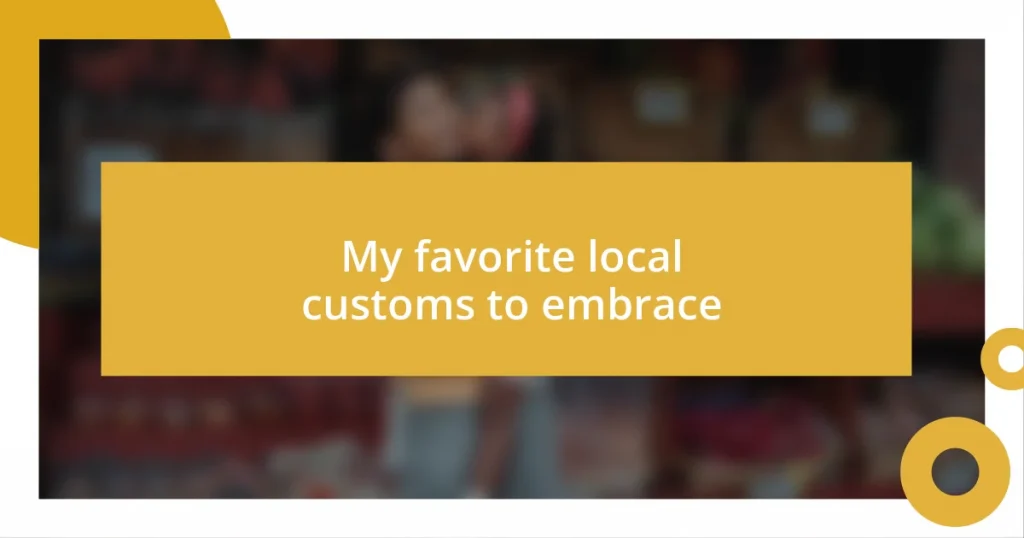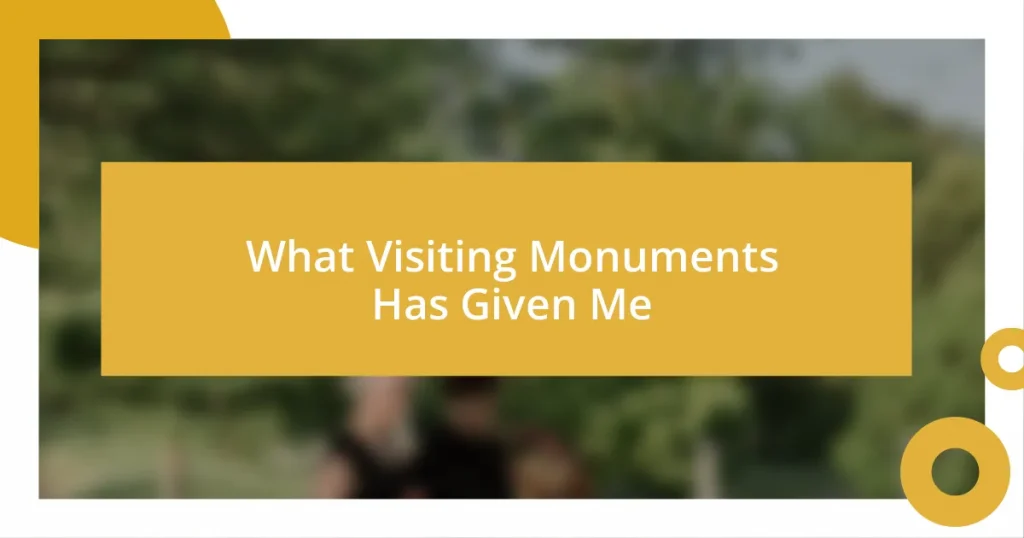Key takeaways:
- Understanding and embracing local customs fosters deeper connections and appreciation for diverse cultures, enhancing the travel experience.
- Participating respectfully in traditions, such as ceremonies and communal meals, allows for memorable interactions and mutual respect.
- Engaging with locals through storytelling and hands-on activities transforms observers into participants, enriching their understanding of cultural significance.

Understanding local customs
Understanding local customs can be a fascinating journey into the heart of a community. From my experience visiting small towns, I found that these customs often reveal the values and history of the people. Have you ever felt that deep connection when participating in a local festival? It’s a unique sensation that draws you into the fabric of the community.
As I navigated unfamiliar territories, I realized that gestures and greetings can significantly differ. For instance, in one place, a simple handshake is enough, while in another, a warm hug might be the norm. This made me wonder: how can we fully appreciate a culture if we don’t take the time to learn these subtle nuances? Embracing these interactions can transform a moment from ordinary to extraordinary.
Moreover, I’ve discovered that local customs often stem from a blend of traditions passed down through generations. In one village I visited, the townsfolk still celebrate an age-old rite to mark the changing seasons—something that made me reflect on my own traditions back home. How do these rituals shape our identity, and how can we honor them in our daily lives? Understanding local customs is not merely an intellectual exercise; it’s a pathway to deeper connections and shared experiences.
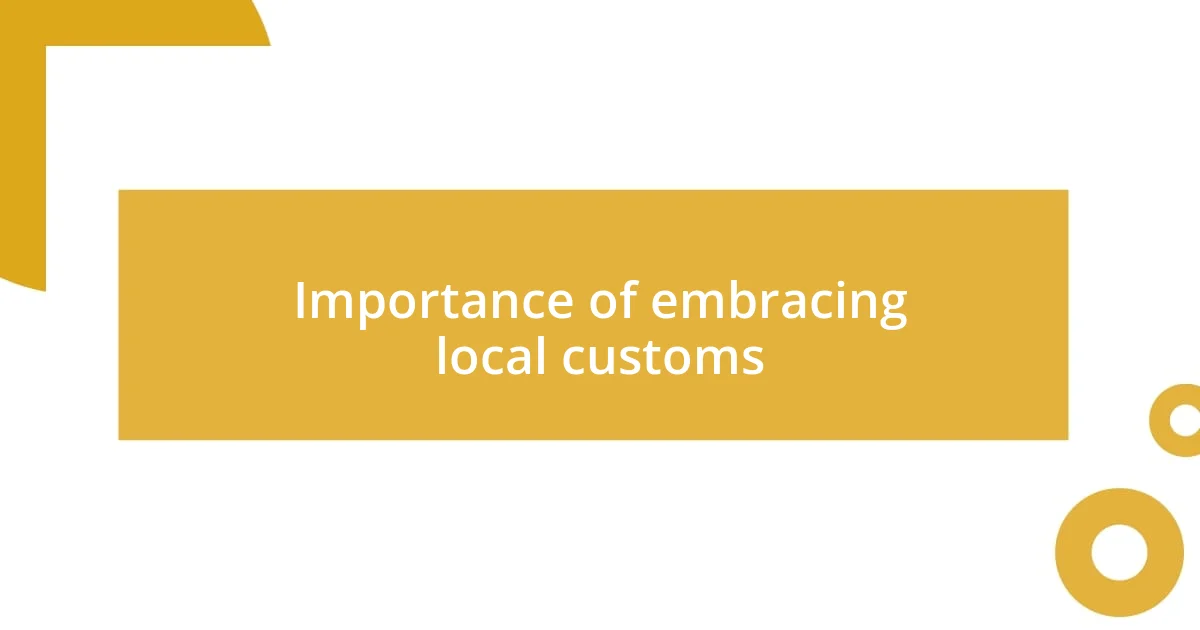
Importance of embracing local customs
Embracing local customs is vital for fostering a sense of belonging and connection within a community. During my travels, I often engage with locals through their unique traditions. For example, I once participated in a traditional tea ceremony in Japan. The delicate movements, shared silence, and deep respect for every step made me feel like I was not just an observer but a part of something larger than myself. It highlighted how customs serve as a bridge, allowing us to connect emotionally with diverse cultures and their histories.
Benefits of embracing local customs:
– Builds community: Engaging with local traditions fosters relationships with residents, making visitors feel more welcomed.
– Enhances cultural appreciation: Experiencing customs provides insights into a community’s values and history.
– Promotes mutual respect: Understanding customs encourages a sense of empathy and consideration for different ways of life.
– Creates lasting memories: Participating in local events or festivals often leads to unforgettable experiences and stories to cherish.

Popular local customs to appreciate
When exploring popular local customs, I’ve found that festivals are often at the heart of community life. For instance, during a vibrant Día de los Muertos celebration in Mexico, I was moved by how families honored their loved ones with altars filled with photos and offerings. The colors, sounds, and shared stories created a powerful atmosphere of connection and remembrance. It’s moments like this that remind me just how rich and intricate local customs can truly be.
I also recall a time spent in a small Italian village, where I was invited to join in the annual grape harvest. The laughter and camaraderie among the villagers as we crushed grapes together felt like I was stepping into a living history book, where every foot stomp resonated with generations of tradition. Such experiences are priceless; they draw people together and foster a strong sense of belonging.
One custom I truly appreciate is the art of sharing a meal. In many cultures, food plays a central role in fostering connections. I experienced this in Morocco while enjoying a tagine with a local family. Their warmth and openness during the meal made me feel like I was part of their family, creating bonds that transcended language and cultural barriers. It’s these shared experiences that enrich our travels and leave lasting impressions.
| Local Custom | Significance |
|---|---|
| Día de los Muertos | Honors deceased loved ones, celebrating memory and connection |
| Grape Harvest | Brings community together through shared labor and tradition |
| Sharing a Meal | Fosters closeness and cultural exchange |
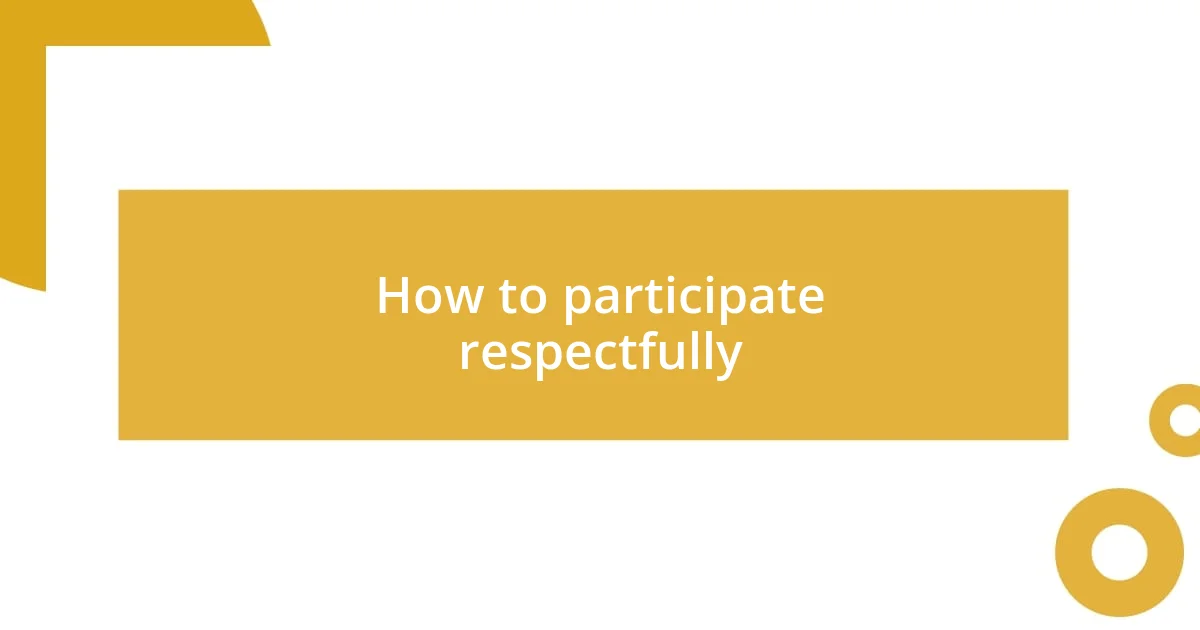
How to participate respectfully
To participate respectfully in local customs, approach each tradition with an open mind and a genuine desire to learn. I remember attending a local festival in a village where, during the opening ceremony, they encouraged everyone to join in the traditional dance. Instead of jumping in right away, I observed the movements and energy before closely following along. By doing so, I respected the tradition and heightened my appreciation for the experience.
It’s also crucial to understand the cultural context behind each custom. For instance, while visiting a sacred site, I noticed a sign reminding visitors to dress modestly. This was a moment of reflection for me. I realized that respecting local customs isn’t merely about adherence to rules—it’s about honoring the values and beliefs embedded within them. This understanding deepens the connection you create with the people and the culture.
Lastly, when engaging with locals, always express gratitude and appreciation. During a communal meal in a small town, I made sure to compliment the host on the dish and everyone’s contributions. It not only made the atmosphere warmer but also fostered a sense of connection. Engaging in genuine dialogue and showing interest in their stories creates a shared space of mutual respect, making every interaction memorable. Have you ever felt that sense of belonging just by sharing a simple “thank you”? That’s the power of respect in action.
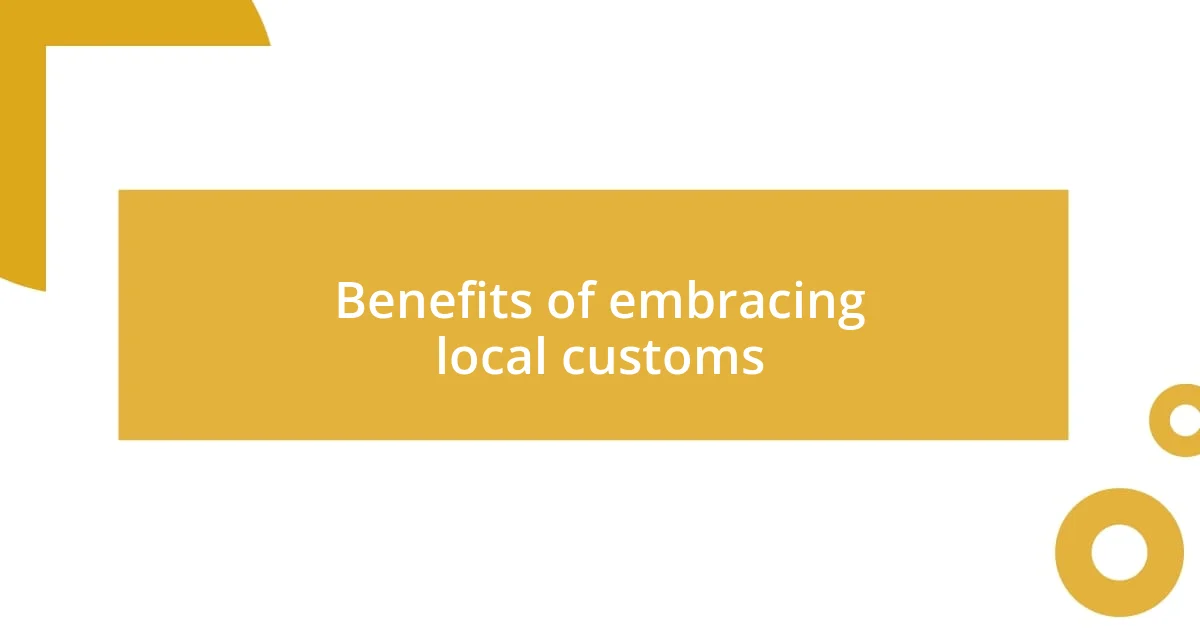
Benefits of embracing local customs
Embracing local customs can significantly enrich our lives. For example, when I participated in a traditional tea ceremony in Japan, I was struck by the delicate attention to detail and the serene atmosphere. Every sip of tea felt like a moment to pause and reflect, reminding me of the beauty in slowing down. Isn’t it fascinating how such simple acts can provide profound insights into a culture’s values?
Beyond personal growth, engaging with local customs allows us to build meaningful connections with others. I recall attending a Diwali celebration with a friend’s family, where each ritual held a purpose and backstory. Sharing in their joy and understanding the significance of lighting the diyas created a profound bond. It sparked the question: How often do we overlook the stories behind the traditions we encounter?
Moreover, embracing these customs can inspire a greater appreciation for our diverse world. I once joined a tribal dance in a Native American community, a moment bursting with energy and history. The drumming resonated deep within me, connecting me not just to the dancers, but to the collective spirit of their heritage. Have you ever experienced such a powerful connection that it left you changed? These moments remind us that every tradition carries the weight of history, bridging gaps between our individual lives and the tales of those who came before us.

Tips for engaging with locals
To truly engage with locals, I recommend starting conversations that invite storytelling. On a trip to a small coastal town, I casually asked an elderly fisherman about his day. That chat turned into a two-hour exploration of his life, filled with tales of the sea. It was eye-opening to hear about both the challenges and joys he experienced over decades. Have you ever discovered hidden gems about a place just by asking a simple question?
Moreover, don’t underestimate the power of participating in local activities. I remember joining a pottery workshop in a village where artisans shared their techniques. Not only did I learn something new, but I also forged connections with the locals as they laughed at my clumsy attempts. Experiencing their passion firsthand deepened my appreciation for the craft. Isn’t it interesting how hands-on involvement can transform a mere observer into part of the community?
Finally, be mindful of body language. I once noticed that simply Leaning in slightly while someone spoke made them feel valued. They responded with more enthusiasm and shared even deeper insights about their culture. Genuine interest often invites openness, creating a space where relationships can flourish. How do you usually convey your interest when connecting with people?

Personal experiences with local customs
One of my most memorable experiences with local customs happened during a family celebration in Spain. I joined in the festivities of La Tomatina, where we all gathered to throw tomatoes at one another. It was chaotic but thrilling, and for those brief hours, the barriers of language and culture melted away. The laughter and camaraderie among strangers made me feel part of something greater. Have you ever felt such exhilarating unity through shared silliness?
Another meaningful encounter occurred when I tried learning a traditional dance in Hawaii, the hula. Initially, I was out of my depth, but the patience and warmth of the local dancers quickly eased my embarrassment. They explained that each movement tells a story, connecting me to their ancestry in ways I never expected. I started to see the depth within what I initially deemed just choreography. How often do we engage without understanding the layers beneath?
I also cherish my experience at a local food market in Thailand, where I was invited to share a meal with a small group of vendors. The moment I tasted their homemade noodles, I understood just how much love and tradition went into culinary practices. It was an intimate gathering, filled with laughter and storytelling about family recipes passed down through generations. Don’t you think that sharing food can bridge cultural divides in a way nothing else can?










